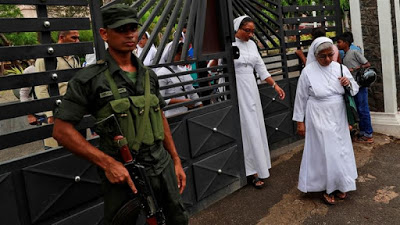Sri Lanka lifts social media ban imposed after Easter attacks
 |
| Aljazeera 30 Apr 2019 |
Sri Lanka’s president lifts nationwide ban on social media sites a day after he used emergency powers to ban face veils.
Sri Lanka’s president has lifted a nationwide ban on social media sites, a day after he used emergency powers to ban veils worn by some Muslim women as part of a security clampdown following Easter suicide bomb attacks.
President Maithripala Sirisena on Tuesday ended the blocking of Facebook, WhatsApp, YouTube and other popular sites, but asked the public to “act in a responsible manner” on social media, according to a government statement.
The government had said it was seeking to curb the spread of misinformation when it blocked social media in the wake of the April 21 bombings at churches and luxury hotels that killed 253 people.
Sri Lankan officials have warned that suspects linked to the attacks are still at large.
On Monday, the Islamic State of Iraq and the Levant (ISIL, also known as ISIS) leader claimed to appearfor the first time in five years in a video released by the group’s propaganda arm.
Abu Bakr al-Baghdadi, to whom the suicide bombers in the Easter attacks apparently pledged their loyalty, claimed the bombings in Sri Lanka were “part of the revenge” that awaits the West.
Authorities initially blamed the attacks, targeting three hotels and three churches, on a local suspect named Mohammed Zahran and his followers.
Two days later on April 23, ISIL released images of Zahran and others pledging their loyalty to al-Baghdadi.
Cardinal Malcolm Ranjith, the archbishop of Colombo and the Catholic Church’s top official on the island, has been a vocal critic of the government’s apparent failure to share near-specific intelligence on the Easter attacks plot and some of the suspects involved.
Ranjith told reporters on Tuesday that the ban on the face veil was a good step.
Also on Tuesday, the United States ambassador to Sri Lanka said she believes members of the armed group may be planning more assaults.
“We do believe that the terrorist threat is ongoing and there may be active plotters. Active members of the attack group that carried out the terror attacks on Easter Sunday may still be at large,” Ambassador Alaina Teplitz told Reuters news agency in an interview.
“We certainly have reason to believe that the active attack group has not been fully rendered inactive. We do believe that there is active planning under way.”


